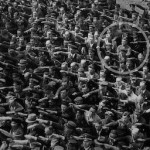Last week Sony Entertainment (Columbia Pictures) bowed to pressure from a cyber-terrorist group known as the GOP (Guardians of Peace) and announced that the comedy “The Interview,” which depicts the assassination of North Korean leader Kim Jong-un, would not be released to theaters or online. The primary impetus behind this decision appears to be the threat of “9-11” style attacks on any theater that might dare show it. Being unsure of the credibility of the threat it would appear Sony decided to err on the side of caution and thus retracted the film from its anticipated Christmas release.
That decision was met with near universal indignation by basically the whole world. Many found it outrageous that a small group of people (believed to be North Korean government) could dictate to others what they may or may not see. Even President Obama weighed in on the decision, stating that he thought Sony had “made a mistake.”
Ok, so to summarize the events thus far: group of people A is using the threat of violence in order to influence the behavior of group of people B so that group of people C may not experience something that group A does not approve of. When abstracted this way does this pattern now seem more familiar? Yes, government. The only thing different about this situation is that people who are themselves usually in group A (governments and those that support their actions) now find themselves in group C. Not so much fun when someone else is doing the threatening, is it? As Americans, with our long tradition of (mostly) respecting freedom of expression, we are particularly outraged to be denied our basic human right to bear witness to fart jokes. In public we pretend that film banning doesn’t occur here, but privately we must admit that it does. Films have been banned in the US at various governmental levels for varying lengths of time (see: Monty Python’s the Life of Brian, The Last Temptation of Christ, The Tin Drum, The Profit, and Hillary: The Movie). Most recently the US 9th Circuit Court of Appeals ordered Google to remove “The Innocence of Muslims” video from their website. America is hardly free of the stain of participating in group threats of violence to prevent others from witnessing particular media.
But yes, we should be upset that anyone would try to use the threat of violence or intimidation in order to influence what we may or may not watch. However, if one wishes to shed all remnants of hypocrisy, then one must also acknowledge that government, all governments, use this exact same method (threat of violence) in order to ensure that the will of some arbitrary group of people living in spot A is imposed upon some other arbitrary group of people living in spot B. Sometimes these threats seek to enforce a ban on a film and sometimes they seek to enforce other arbitrary edicts masquerading as “law”. The ends matter not; it is the means that are illegitimate. If one is rightfully offended that North Korea might seek to use threats of violence to alter ones behavior, then one should likewise take equal offence when anyone, anywhere, at anytime, seeks to alter the peaceful behavior of another with violence or intimidation irrespective of what honorific they endow themselves with.
Fortunately this story has a happy ending. A few days later Sony reversed their decision and announced that “The Interview” would appear both online and in theaters, albeit in a limited fashion. Considering how hard someone tried to make sure I couldn’t watch it, well, naturally now I had no choice but to go out of my way to watch it! Was it worth it? Well, as they say, there’s no accounting for taste, but, I did enjoy it. As long as one is exposed to puerile humor in small, intermittent doses (like capsaicin) it can be amusing. This film was not meant to be a political satire. There is no stinging tongue-in-cheek critique of North Korea (although unexpectedly the Kim Jong-un character zinged his American interviewer with the fact that per capita the US has more people in prison than North Korea (thank you drug war)). There is just some good old-fashioned escapist daydream-as-a-plot in which the main character kills the bad guy, saves the country from nuclear annihilation, and becomes the hero he always believed himself to be.








